Travel Better: The Importance of Surrendering
How a trip to Puglia taught me to let go in my first year as a travel writer…
“Do you want to stop for coffee?” Gianfranco, my driver from Puglia Auto Classica asked me as we walked through the archway into Monopoli’s old town. It was early in the morning and cafés were slowly beginning to open. I hesitated for a second because I didn’t want to waste time as I was booked for only three hours with him and had three towns I wanted to squeeze in during that period. I was living in New York City at the time and had recently transitioned from a fashion editor to a travel writer. I was on one of my first assignments for a big publication so I felt the pressure to deliver what I convinced myself would be the best insights from my trip to Puglia. (Although, as it was my first time in Puglia, believing that I had any clue was my first mistake.) At the risk of sounding impolite, I asked if we could take it to go. He laughed. “We don’t take our coffee to go in Puglia. We sit and enjoy it.” We skipped the coffee and continued walking.
Weaving our way through the narrow, winding streets framed by medieval walls, I watched as the local fisherman carefully untangled their fishing nets, and arranged their rods, bait, and traps as they prepared for their day at sea. Monopoli held historic significance due to its strategic position on the Adriatic, Gianfranco explained. In ancient times, I learned, it served as a crucial port for Greek, Roman, and later Byzantine and Venetian trade routes, while its fortified harbor and city walls protected against invasions, making it both an important trade and military outpost. From balconies of the traditional limestone buildings, bursts of bougainvillea, geraniums, and jasmine spilled over in vibrant reds, pinks, and purples. The labyrinth of alleys opened to hidden squares, where locals lingered over their morning espressos, chatting with friends. No one seemed to be in any hurry.
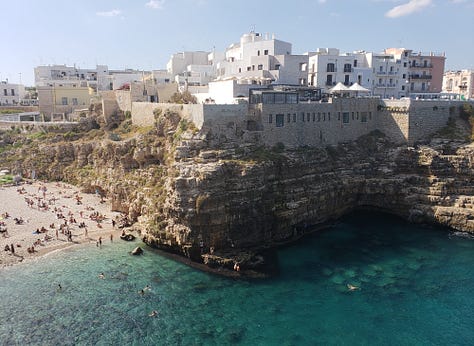
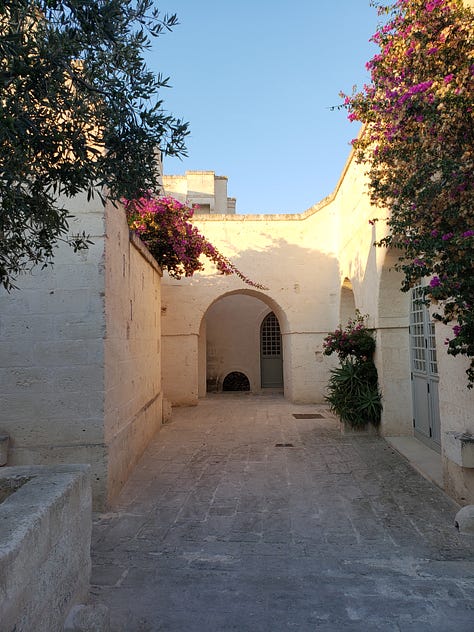
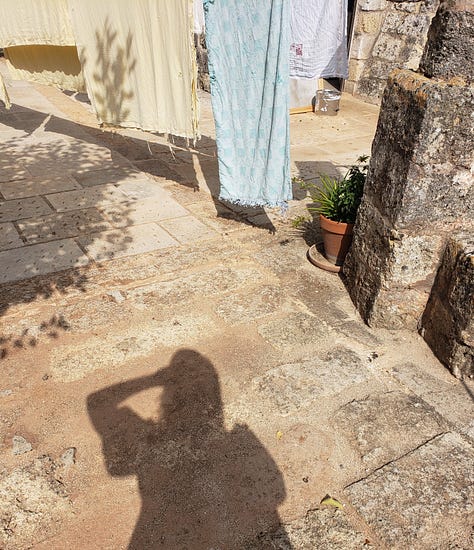
From Monopoli, Gianfranco drove me to the next town I’d asked to see that day: Polignano a Mare. He had warned me that it was very touristy and suggested that we skip it. I stood firm and asked to go anyway. With the exception of its most famous landmark—Lama Monachile, a dramatic cove flanked by limestone cliffs—frankly, he was right.
The more time I spent with him, the more his laid-back disposition began to rub off on me. He asked if he could bring me to another town that wasn’t on my list. “Sure,” I surrendered, slightly defeated and acutely aware of how uptight I’d appear if I resisted his suggestion again. “Let’s go.” We got back into his vintage Alfa Romeo Duetto and cruised through the countryside over to Locorotondo. Along the way, with the warm breeze kissing my skin, I felt a sense of relief wash over me and I proceeded to take the first exhale I was conscious of.
I was beginning to understand the meaning of il dolce far niente—the sweetness of doing nothing. It’s about being present, enjoying a moment without needing to be productive. After years of working in the fast-paced bubble of New York City—especially in fashion, where we’re always two seasons ahead—I had to retrain myself to keep my head where my feet are.
I feel ashamed to admit that it feels like a rite of passage into the American experience to believe that more is more and faster is better. It’s also somewhat part of the American identity to believe we know best. We heard it from our well-traveled friend who visited once before or The New York Times travel section told us so.... But these stubborn beliefs combined with our perpetual need for control are limiting our ability to leave space for the unexpected—for life’s quiet magic that can’t be planned or predicted. When we’re constantly measuring a place—or even a moment—against some internal checklist of efficiency, worth, or aesthetic perfection, we miss the quiet, beautiful truths that reveal themselves only when we slow down.
Il dolce far niente isn’t just an indulgence; it’s a kind of surrender, a practice in trust. Trusting that doing nothing or moving at a slower pace is not wasted time. That presence is enough. That life doesn’t always need to be hacked, optimized, or squeezed for value. And maybe, just maybe, the most productive thing we can do for ourselves is let go. Fortunately, I understand now, years later, that letting the rhythm of a place be our guide— I mean especially in Southern Italy—is the whole damn point!
When Gianfranco and I finally arrived in Locorotondo, we strolled through the white-washed village and I was taken aback by the beauty. It was quiet and quaint, simple and unassuming– it was perfect. We sat for a glass of wine and he told me that to really see Puglia you have to let yourself get a little bit lost. “Be conquered by the mood,” I remember him saying. I’m not even sure what I was originally in a rush to find, but when I let go, I gained more than what my plans could have possibly had in store for me that day. Gianfranco said he saw a change in me from when he first picked me up. I was more relaxed. He dropped me off two hours late. He didn’t charge for the extra time.
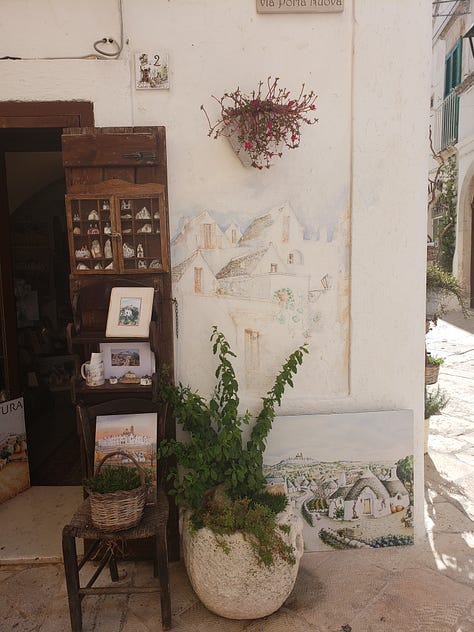



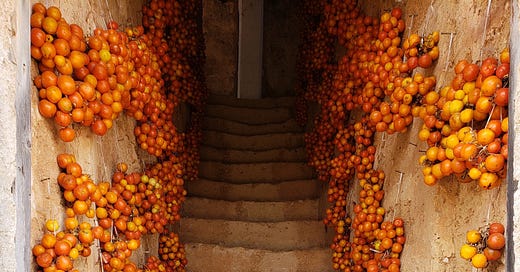



Couldn’t agree more
loved this Monica!